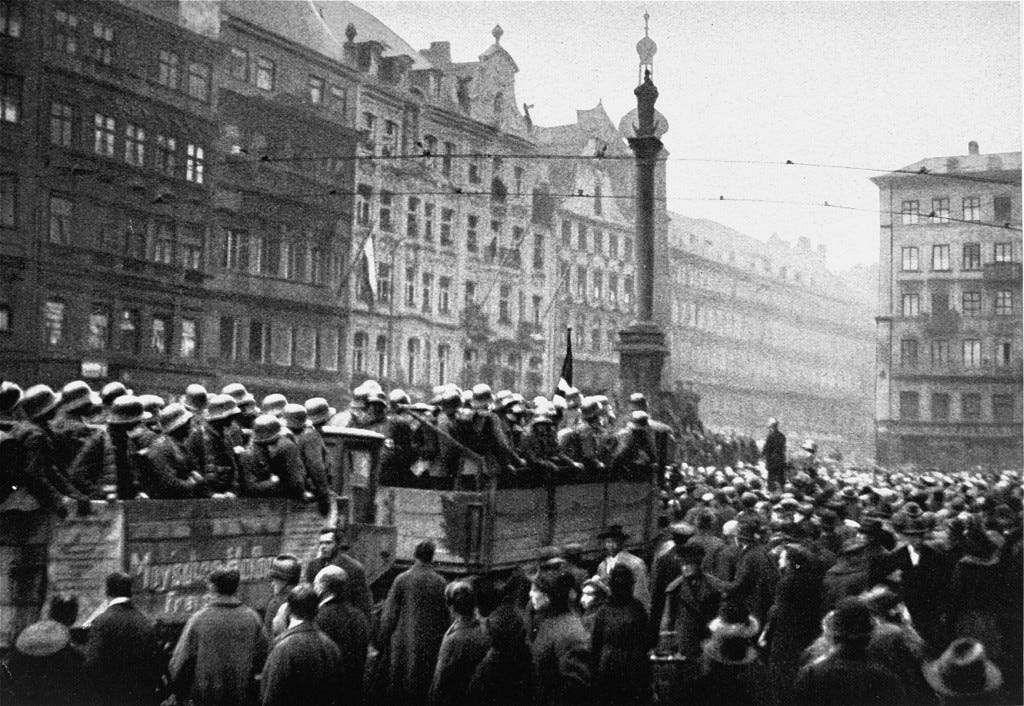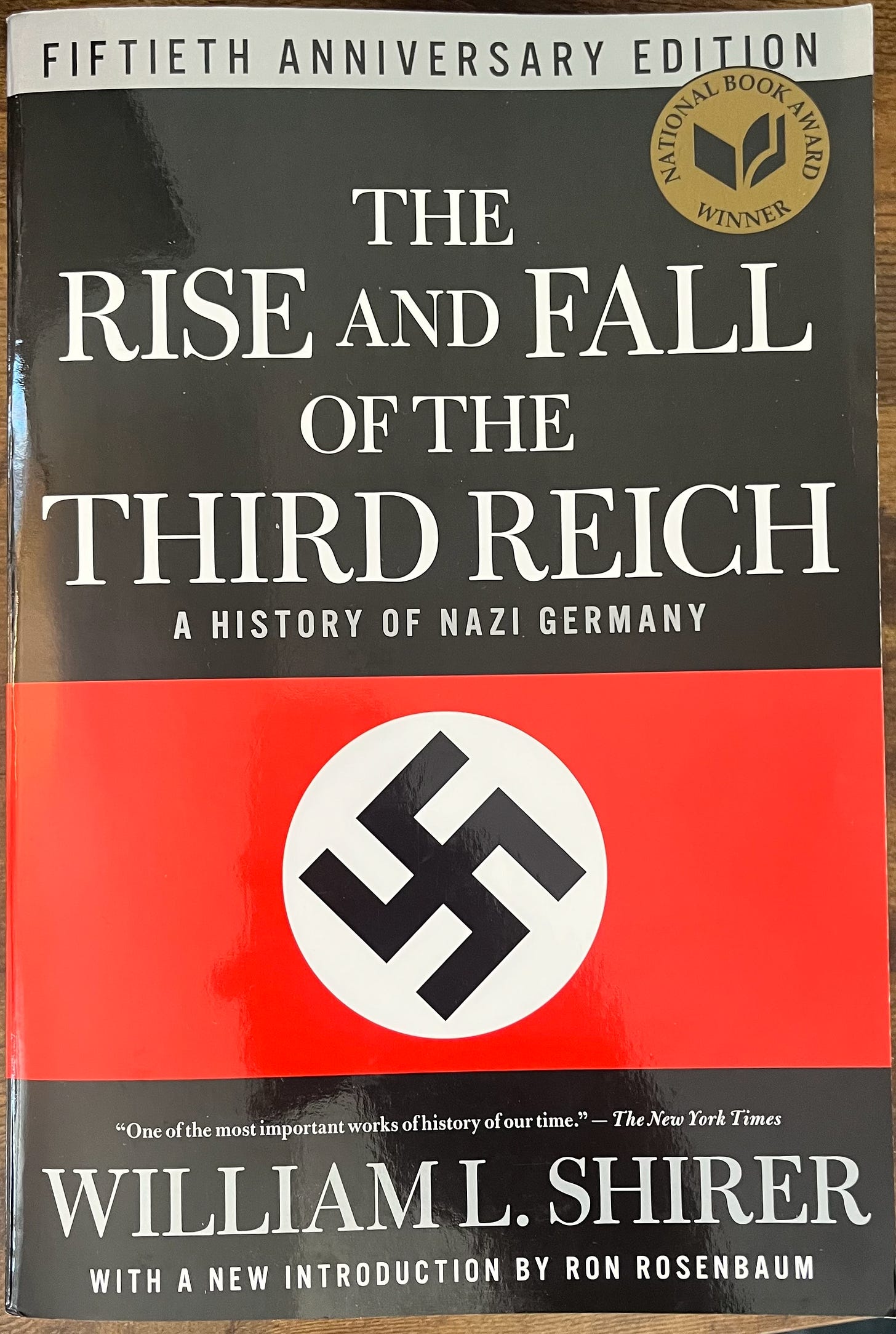Rise and Fall Ch. 3: Versailles, Weimar and the Beer Hall Putsch
In the third chapter summary of "The Rise and Fall of the Third Reich", we return to the end of WWI and creation of the Weimar Republic in order to understand the Beer Hall Putsch a few years later
We are now reaching the end of week two of our reading group of William L. Shirer’s The Rise and Fall of the Third Reich.
ICYMI: While we have all been reading this past week, I…
posted our first podcast on the American understanding of Hitler
and, in the interest of good debate, gave you a contrarian take on Shirer’s book from an imminent historian.
Please check them out if you haven’t already.
Also, if you missed the last chapter recaps, please check them out:
Previous Chapter Recaps
I didn’t get any takers when I proposed a Zoom discussion last week. But I am certainly open to meeting some of you (or reconnecting, as the case may be) and chatting about this week’s reading. So if you are interested in discussing the book or just want to ask some questions, please let me know in the comments, and I’ll see what I can do.
If you’ve thought of a friend while you follow along, please feel free to share! It’s still possible to catch up in a way it won’t be in a month or two.
Today, I offer a recap of chapter 3 and then over the weekend, I’ll post about chapter 4.
As you’ll remember, the first two chapters The Rise and Fall of the Third Reich covered the life of Adolf Hitler from his birth in 1887 through his childhood, bohemian years in Vienna and Munich, World War I service on the Western Front, through the foundation of the Nazi Party in 1920 and up to 1923.
We encounter a young man with overweening self-confidence and little to nothing to back up that self-confidence. Before the war, Hitler was a bohemian of the straight edge variety, who abstained from alcohol and tobacco, and idealized women without ever pursuing them. During the war, the Austrian corporal was more hard core about the war and the German nation than his fellow German soldiers. And after the war, as he got involved in German nationalist circles in Munich, he works his way up from being a nobody, emerging as a strategic and deeply competent organizer who brooks no dissent.
The Nazi Party itself brought together a weird hodge-podge of individuals—sadists with whips, crippled intellectual leftists, anti-leftist World War I veterans, all of whom were rabid nationalists of one degree or another. Unlike other right-wing parties, though, the Nazi Party wasn’t conservative in wishing to return to the Hohenzollern monarchy, but it shared many of the same values as the Army, including a skepticism of the fledgling Weimar republic and liberal constitutionalism more generally, which it considered weak. Its core was in the lower middle class of German society—the masses who suffered through Weimar inflation and were deeply attached to their own German culture.
In his history of Hitler and the Nazi Party, Shirer has now worked up to 1923, when the infamous Beer Hall Putsch happened. However, rather than proceeding chronologically, as he has since the third or fourth page, he now goes back in time again to the end of World War I. The reason for this choice, I assume, is that in order to understand the politics and personalities of the Beer Hall Putsch (and why it failed), you need the back story.
Shirer tries to get at why the Weimar Republic was so unloved, by whom, and for what reasons. There was an ambiguous relationship to the acceptance of defeat and the harsh conditions of the Versailles treaty. Not being on the same page about the past created problems later on. The socialists (the moderate left, as opposed to the far-left Communists) played a key, if accidental, role in the creation of the Republic, with a strange relationship to the Army. Shirer traces some of the problems that later doomed Weimar to this moment. The Army was left unreconstructed, becoming a state within a state, unaccountable to elected officials.
When inflation hit hard in the early 1920s and Germany stopped payments, the French reoccupied the Ruhr region near their border. Eventually, Germany resumed German reparation payments, in a decision that was denounced by both far-left and far-right. The far-left Communists and the right-wing nationalists and restorationists all denounced the Republic. And rebellions against the national government in Berlin occurred throughout the country. In Bavaria, a triumvirate of leaders led the resistance. A state of emergency was called.
Hitler—we must remember—was not a conservative. He was of the radical right. The conservatives wanted to restore the Wittelsbach monarchy in Bavaria. Hitler did not. He was of the radical right, a nationalist right that—in aesthetics and politics—looked forward not backwards. It did not want traditional monarchy or any kind of multinational empire, but rather a new and modern non-democratic state based exclusively around German ethnicity. Hitler was worried that in the chaos in the fall of 1923, the conservatives would restore the monarchy and so he rashly chose to take action.
The Beer Hall Putsch, which occurred on the evening of November 8, 1923, was a rather comical affair with a good number of tactical errors. None of the triumvirate Bavarian rebels or World War I hero General Ludendorff actually wanted to play a role in Hitler’s coup, after it began in a Munich beer garden. Hitler somehow managed to convince them to temporarily go along with the plan, but then he left the recalcitrant participants alone.
Lo and behold, they did not mastermind a full takeover of the city in his absence. To recapture the momentum, Hitler and Ludendorff then decided to march on the center. At a crucial moment, the rebels exchanged fire with the police, leading to a number of deaths (who would be commemorated every year under the Nazi regime), but none of the Nazis (including Hitler) accompanied Ludendorff when he continued on in the face of fire. It was a “fiasco,” Shirer concludes. Ludendorff was arrested on the spot, and Hitler was arrested two days later.

Hitler’s trial for the Beer Hall Putsch a few months later reveals the depth of his strategic thinking. Rather than being ashamed that he had failed in his putsch and was now about to spend time in jail, he embraced the trial. With national and international media covering the trial, Hitler has a great opportunity to get his message across to a wider audience. Rather than pretending he hadn’t attempted to overthrow the government or that the events were misunderstood, Hitler straight up owned it. He was a “revolutionary against the revolution,” someone who rejected the state. He wouldn’t answer to the court of Weimar, but rather to “the eternal court of history.”
Hitler escaped deportation to Austria and went into prison on April 1, 1924. By December 20 of that year, he was released. He began to work intently on a book, a book that would later be published as Mein Kampf.




